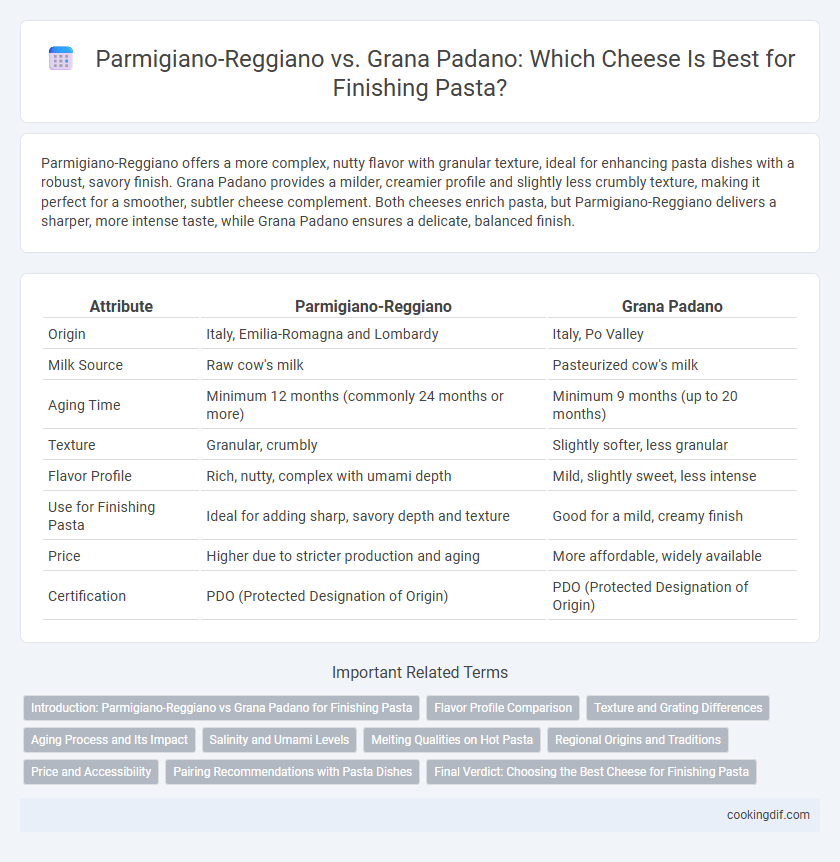Parmigiano-Reggiano offers a more complex, nutty flavor with granular texture, ideal for enhancing pasta dishes with a robust, savory finish. Grana Padano provides a milder, creamier profile and slightly less crumbly texture, making it perfect for a smoother, subtler cheese complement. Both cheeses enrich pasta, but Parmigiano-Reggiano delivers a sharper, more intense taste, while Grana Padano ensures a delicate, balanced finish.
Table of Comparison
| Attribute | Parmigiano-Reggiano | Grana Padano |
|---|---|---|
| Origin | Italy, Emilia-Romagna and Lombardy | Italy, Po Valley |
| Milk Source | Raw cow's milk | Pasteurized cow's milk |
| Aging Time | Minimum 12 months (commonly 24 months or more) | Minimum 9 months (up to 20 months) |
| Texture | Granular, crumbly | Slightly softer, less granular |
| Flavor Profile | Rich, nutty, complex with umami depth | Mild, slightly sweet, less intense |
| Use for Finishing Pasta | Ideal for adding sharp, savory depth and texture | Good for a mild, creamy finish |
| Price | Higher due to stricter production and aging | More affordable, widely available |
| Certification | PDO (Protected Designation of Origin) | PDO (Protected Designation of Origin) |
Introduction: Parmigiano-Reggiano vs Grana Padano for Finishing Pasta
Parmigiano-Reggiano offers a bold, nutty flavor and gritty texture that enhances the richness of pasta dishes, making it ideal for finishing. Grana Padano provides a milder, slightly creamier taste with a smooth finish that complements delicate pasta sauces without overpowering them. Both cheeses bring distinct regional qualities and aging processes that influence their suitability as finishing touches.
Flavor Profile Comparison
Parmigiano-Reggiano offers a complex, nutty, and fruity flavor with a granular texture that enhances pasta dishes with rich umami notes. Grana Padano has a milder and slightly sweeter taste, featuring a creamy and less crumbly texture that provides a subtle, buttery finish. Choosing between the two depends on whether a bold, intense flavor or a gentle, smooth accent is desired for the pasta.
Texture and Grating Differences
Parmigiano-Reggiano offers a granular texture that grates into light, fluffy flakes, enhancing pasta dishes with a robust, crystalline finish. Grana Padano features a slightly softer, more pliable texture, producing finer, denser shavings that melt smoothly on hot pasta. The distinct crystal structure in Parmigiano-Reggiano provides a more pronounced, crunchy bite, while Grana Padano's texture results in a creamier coating effect when grated.
Aging Process and Its Impact
Parmigiano-Reggiano undergoes a minimum aging process of 12 months, often extending to 24 or 36 months, resulting in a complex, granular texture and intense umami flavor that enhances pasta dishes with depth and richness. Grana Padano is aged from 9 to 20 months, producing a milder, creamier cheese with less granular texture, offering a smoother finish ideal for lighter pasta recipes. The extended aging of Parmigiano-Reggiano contributes to a stronger aroma and sharper taste, making it a preferred choice for finishing robust pasta sauces.
Salinity and Umami Levels
Parmigiano-Reggiano boasts higher umami intensity and a pronounced saltiness that enhances pasta dishes with complex savory depth. Grana Padano offers a milder salt content and subtler umami notes, providing a smoother, less aggressive finish. The elevated salinity and rich glutamate profile in Parmigiano-Reggiano make it the preferred choice for bold flavor enhancement in pasta recipes.
Melting Qualities on Hot Pasta
Parmigiano-Reggiano offers superior melting qualities on hot pasta due to its granular texture and balanced fat content, which creates a creamy consistency without clumping. Grana Padano melts well but tends to be slightly less creamy, as its milder flavor profile and lower aging period influence texture and meltability. Both cheeses enhance pasta dishes, yet Parmigiano-Reggiano's refined melting properties make it the preferred choice for a smooth, luscious finish.
Regional Origins and Traditions
Parmigiano-Reggiano, hailing from Emilia-Romagna and parts of Lombardy, is crafted under strict regulations reflecting centuries-old traditions, producing a robust, nutty flavor ideal for finishing pasta dishes. Grana Padano originates from the Po River Valley, spanning multiple regions, offering a milder, slightly sweeter taste preferred in Northern Italian cuisine. Both cheeses exemplify regional terroir and aging techniques that uniquely enhance pasta's texture and flavor profiles.
Price and Accessibility
Parmigiano-Reggiano typically commands a higher price than Grana Padano due to its longer aging process and strict production standards, making it a premium choice for finishing pasta dishes. Grana Padano offers a more affordable and accessible alternative, widely available in supermarkets and suitable for everyday use without compromising flavor. Both cheeses provide rich umami profiles, but Grana Padano's price point makes it ideal for frequent pasta seasoning while Parmigiano-Reggiano is favored for special occasions.
Pairing Recommendations with Pasta Dishes
Parmigiano-Reggiano enhances rich, creamy pasta dishes like Fettuccine Alfredo or Carbonara with its complex, nutty flavors and granular texture, offering a bold finish. Grana Padano pairs well with lighter pasta recipes such as Primavera or simple aglio e olio, providing a milder, buttery taste that complements fresh vegetables and olive oil. Both cheeses melt smoothly but selecting Parmigiano-Reggiano or Grana Padano depends on the desired depth and intensity of flavor in the pasta dish.
Final Verdict: Choosing the Best Cheese for Finishing Pasta
Parmigiano-Reggiano offers a more complex and nutty flavor profile with granular texture, making it ideal for finishing rich pasta dishes and enhancing umami depth. Grana Padano provides a milder, slightly creamier taste with a subtle sweetness that complements lighter pasta sauces without overpowering them. For an authentic Italian finish, Parmigiano-Reggiano remains the top choice due to its robust character and traditional aging process.
Parmigiano-Reggiano vs Grana Padano for finishing Infographic

 cookingdif.com
cookingdif.com